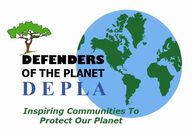cURRENT pROJECTS

Under a theme of tree planting for climate justice, Defenders of the Planet is currently implementing a tree planting projects in Rukoki and kahokya sub- counties-Kasese District.
The project is implemented with support from the Margaret Hayman Charitable Trust and Plant for the Planet. The overall goal of the project is to provide 2 million tree seedlings for planting.
About Us
DEPLA has planted over 1,000,000 trees in Uganda, converted hundreds of acres of degraded lands to sustainable use and saved thousands of acres of forest from the wild fires. DEPLA has also trained 1,300 community members on constructing energy saving mud stoves as well as conserving wetlands.

WILDLIFE CONSERVATION

Defenders of the Planet is committed to conservation of wildlife and its allied natural resources. There is a threat of poaching, habitat loss and increasing cases of human-wildlife conflict in the protected areas. This requires extensive investment into anti poaching programs, community education and the establishment of good practices to protect wildlife animals from extinction. The conflict normally occurs when animals goes to the gardens and destroys crops and due to this, the farmers revenge by poaching, poisoning and other cases. This situation needs to be addressed sooner than later because wildlife animals are at a high risk of being extinct. Raising public awareness on the relevance of wildlife conservation, empowering communities with technical expertise and trainings on how to live in harmony with wildlife animals is a solution that requires extensive investment.
WETLANDS AND RIVER CATCHMENT CONSERVATION

Several wetlands are under increasing pressure and in the process of loosing many of their important functions.
In Uganda, millions of people rely to a great extent on wetlands for their livelihoods and food security. History and practice have shown that where wetlands are degrading poverty generally increases, increasing pressure on remaining wetland resources and leading to further wetland degradation.
As many people depend for their survival and income on goods and services provided by these wetlands, wetland degradation has threatened their livelihoods and they have nothing to fall back on. This has lead to increased poverty as well as over-exploitation of wetlands.
The quality of water in the wetlands has deteriorated due to poor use of wetlands such as agriculture work among others. This has led to a problem of lack of good water for various uses, siltation of rivers, and threatened biodiversity among others because the wetland no longer perform all its functions of water purification and storage.
Most of the people and landowners have no idea of what wetlands are, or why they are so important. People are actively promoting the draining of wetlands as they regard wetlands as ‘wasted lands’.
This ignorance about wetlands, has resulted in approximately 96% of Uganda’s wetlands being destroyed through poor land management. Practices such as unsustainable agricultural practices that have bigger impact include the draining of wetlands for cropping; gully erosion in wetlands resulting from overgrazing; incorrect burning practices; and sedimentation and erosion from poorly built roads. Many of these impacts occur because the community is unaware of the importance of wetlands.
At our present rate of water production and consumption, Uganda will simply not have sufficient freshwater supplies to meet the rising demand by 2035.
The continued destruction of these wetlands will result in the disappearance of these priceless wetland functions and values.
DEPLA is committed to implementing activities in conservation of wetlands AND RIVER CATCHMENTSand biodiversity.
CURRENT PROJECTS

Under a theme of Tree planting for climate justice, Defenders of the Planet is currently implementing tree planting project in Rukoki and Kahokya sub counties-Kasese District.
The project is implemented with support from the Margaret Hayman Charitable Trust and Plant for the Planet foundation. The overall goal of the project is to provide 2 million tree seedlings for planting to vulnerable communities.
